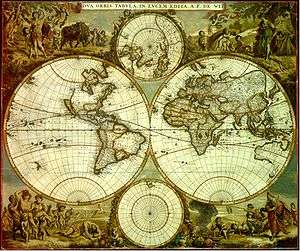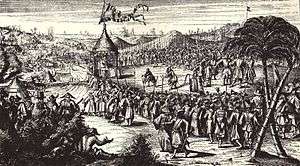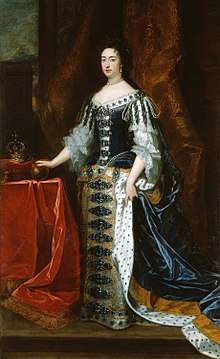1662
1662 (MDCLXII) was a common year starting on Sunday of the Gregorian calendar and a common year starting on Wednesday of the Julian calendar, the 1662nd year of the Common Era (CE) and Anno Domini (AD) designations, the 662nd year of the 2nd millennium, the 62nd year of the 17th century, and the 3rd year of the 1660s decade. As of the start of 1662, the Gregorian calendar was 10 days ahead of the Julian calendar, which remained in localized use until 1923.
| Millennium: | 2nd millennium |
|---|---|
| Centuries: | |
| Decades: | |
| Years: |
| 1662 by topic |
|---|
| Arts and science |
| Leaders |
| Birth and death categories |
| Births – Deaths |
| Establishments and disestablishments categories |
| Establishments – Disestablishments |
| Works category |
|
| Gregorian calendar | 1662 MDCLXII |
| Ab urbe condita | 2415 |
| Armenian calendar | 1111 ԹՎ ՌՃԺԱ |
| Assyrian calendar | 6412 |
| Balinese saka calendar | 1583–1584 |
| Bengali calendar | 1069 |
| Berber calendar | 2612 |
| English Regnal year | 13 Cha. 2 – 14 Cha. 2 |
| Buddhist calendar | 2206 |
| Burmese calendar | 1024 |
| Byzantine calendar | 7170–7171 |
| Chinese calendar | 辛丑年 (Metal Ox) 4358 or 4298 — to — 壬寅年 (Water Tiger) 4359 or 4299 |
| Coptic calendar | 1378–1379 |
| Discordian calendar | 2828 |
| Ethiopian calendar | 1654–1655 |
| Hebrew calendar | 5422–5423 |
| Hindu calendars | |
| - Vikram Samvat | 1718–1719 |
| - Shaka Samvat | 1583–1584 |
| - Kali Yuga | 4762–4763 |
| Holocene calendar | 11662 |
| Igbo calendar | 662–663 |
| Iranian calendar | 1040–1041 |
| Islamic calendar | 1072–1073 |
| Japanese calendar | Manji 5 / Kanbun 1 (寛文元年) |
| Javanese calendar | 1584–1585 |
| Julian calendar | Gregorian minus 10 days |
| Korean calendar | 3995 |
| Minguo calendar | 250 before ROC 民前250年 |
| Nanakshahi calendar | 194 |
| Thai solar calendar | 2204–2205 |
| Tibetan calendar | 阴金牛年 (female Iron-Ox) 1788 or 1407 or 635 — to — 阳水虎年 (male Water-Tiger) 1789 or 1408 or 636 |
| Wikimedia Commons has media related to 1662. |

Nova Orbis Tabula in Lucem Edita is published by Dutch cartographer Frederik de Wit.
Events

February 1: Surrender of the Dutch Fort Zeelandia.
January–June
- January 23 – Battle of Nagyszőllős: János Kemény of Transylvania is killed.
- February 1 – Sino-Dutch conflicts: Chinese general Koxinga seizes the Dutch Fort Zeelandia on the island of Taiwan after a nine-month siege, ending Dutch East India Company rule in the area, then establishes the Kingdom of Tungning. In response, the Kangxi Emperor of the mainland Qing dynasty migrates all residents along the southern coast, by 50 miles.
- March 18 – A short-lived experiment of the first public buses (holding eight passengers) begins in Paris.
- May 3 – John Winthrop the Younger, the son of the first governor of Massachusetts, is honoured by being made a fellow of the Royal Society, England's new scientific society. Winthrop uses his election to the Society to gain access to the king, who grants him a new charter, uniting the colonies of Connecticut and New Haven.
- May 9 – Samuel Pepys witnesses a Punch and Judy show in London (the first on record).
- May 16 – The hearth tax is introduced in England and Wales.
- May 30 – Catherine of Braganza marries Charles II of England; as part of the dowry, Portugal cedes Bombay and Tangier to England.
July–December
- July 15 – The Royal Society receives an official charter in London.
- August 24 – The Act of Uniformity is introduced,[1] making mandatory in the Church of England the forms of worship prescribed in the new edition of the Book of Common Prayer. This is followed by the Great Ejection of over 2,000 clergy, who refuse to take the required oath of conformity to the established church.
- October 27 – Charles II of England sells Dunkirk to France, for £400,000 (2.5 million French livres).
- November – Zheng Jing claims the Kingdom of Tungning.
- November 28 – The English Royal Society holds its first meeting.
- December 20 – Nicolas Fouquet is banished from France.
- December 26 – Molière's play, The School for Wives, premières in Paris.
Date unknown
- Robert Boyle publishes Nova experimenta physico-mechanica in Oxford (2nd edition), setting forth the law bearing his name.
- Joan Blaeu publishes Atlas Maior, sive cosmographia Blaviana in Amsterdam (first complete edition, 11 volumes in Latin).
- Milton, Massachusetts is incorporated as a town.
- John Graunt, in one of the earliest uses of statistics, publishes statistical information about births and deaths in London.
- The Akademie der Bildenden Künste Nürnberg is founded in Germany.
- The dodo bird was seen for the last widely accepted time.[2]
- Sumitomo Money Changer Bank, a predecessor of Sumitomo Mitsui Banking Corporation, is founded in Osaka, Japan.
Births
- January 1 – Balaji Vishwanath, Peshwa of the Maratha Empire (d. 1720)
- January 4 – Jeanne Le Ber, religious recluse in New France (d. 1714)
- January 6 – Robert Sutton, 2nd Baron Lexinton, English diplomat (d. 1723)
- January 9 – John Holles, 1st Duke of Newcastle, England (d. 1711)
- January 12 – Samuel Shute, Governor of Massachusetts Bay and New Hampshire (d. 1742)
- January 17 – Françoise Pitel, French actor (d. 1721)
- January 25 – Luís da Cunha, Ambassador of Portugal (d. 1749)
- January 27 – Richard Bentley, English classical scholar (d. 1742)
- February 9 – Paolo de Matteis, Italian painter (d. 1728)
- February 15 – James Renwick, Scottish minister and Covenanter martyr (d. 1688)
- March 1 – Giovanni Carlo Aliberti, Italian painter (d. 1740)
- March 8 – Augustus William, Duke of Brunswick-Lüneburg (d. 1731)
- March 9 – Franz Anton von Sporck, German noble (d. 1738)
- March 10 – Francis Pierrepont, English politician (d. 1693)
- March 15 – Gabriel Álvarez de Toledo, Royal Librarian of King Felipe V of Spain (d. 1714)
- March 19 – Johann, Count of Leiningen-Dagsburg-Falkenburg (d. 1698)
- March 20 – Giuseppe Averani, Italian jurist and naturalist (d. 1738)
- March 29 – Tsarevna Feodosia Alekseyevna of Russia, daughter of Tsar Alexis of Russia (d. 1713)
- April 9 – Edward Hawarden, English Catholic theologian (d. 1735)
- William Conolly, Irish politician (d. 1729)
- April 11 – Countess Louise Sophie of Hanau-Lichtenberg (d. 1751)
- April 13 – Princess Eleonore Erdmuthe of Saxe-Eisenach, Electress of Saxony (d. 1696)
- April 26 – Francisco Bances Candamo, Spanish playwright (d. 1704)
- April 30 – Mary II of England, Scotland, and Ireland (d. 1694)
- May 3 – Matthäus Daniel Pöppelmann, German architect (d. 1737)
- May 18 – George Smalridge, English Bishop of Bristol (d. 1719)
- June 3 – Willem van Mieris, Dutch painter (d. 1747)
- June 6 – Mannus Riedesel, German architect (d. 1726)
- June 7 – Celia Fiennes, English travel writer (d. 1741)
- June 11 – Tokugawa Ienobu, Japanese Edo shōgun (d. 1712)
- June 18 – Charles FitzRoy, 2nd Duke of Cleveland (d. 1730)
- July 1 – Béatrice Hiéronyme de Lorraine, Abbess of Remiremont (d. 1738)
- July 1 – John Dolben, British politician (d. 1710)
- July 11 – Maximilian II Emanuel, Elector of Bavaria (d. 1726)
- July 20 – Andrea Brustolon, Italian artist (d. 1732)
- August 3 – Countess Sophie Henriette of Waldeck, Duchess of Saxe-Hildburghausen (d. 1702)
- August 5 – James Anderson, Scottish historian (d. 1728)
- August 10 – Charles Boit, Swedish enameller, miniature painter (d. 1727)
- August 12 – Christoph Wilhelm Hufeland, German physician (d. 1836)
- August 13 – Charles Seymour, 6th Duke of Somerset, English politician (d. 1748)
- August 25 – John Leverett the Younger, Massachusetts colonial judge; president of Harvard (d. 1724)
- August 28 – Maria Aurora von Königsmarck, Swedish noblewoman of Brandenburg extraction (d. 1728)
- August 29 – Sebastiano Mocenigo, Doge of Venice (d. 1732)
- September 1 – Louis de Carrières, French priest and Bible commentator (d. 1717)
- September 19 – Jean-Paul Bignon, French priest and man of letters (d. 1743)
- October 3 – Alessandro, Marquis de Maffei, Italian Lieutenant General of Infantry in Bavarian service (d. 1730)
- October 6 – William Walsh, English/British politician (d. 1708)
- October 14 – William Fairfield, Massachusetts Speaker of the House of Deputies (d. 1742)
- October 17 – Arthur Rawdon, English Member of Parliament (d. 1695)
- October 18 – Matthew Henry, English Bible commentator, Presbyterian minister (d. 1714)
- October 19 – William Ernest, Duke of Saxe-Weimar (d. 1728)
- November 2 – Johan Cronman, Swedish general (d. 1737)
- November 7 – Pierre Fatio, Swiss politician (d. 1707)
- November 11 – Alexander Pendarves, British politician (d. 1726)
- November 11 – John Chesshyre, English lawyer (d. 1738)
- November 12 – Francesco Barberini, Italian Catholic cardinal (d. 1738)
- November 19 – John Campbell, 2nd Earl of Breadalbane and Holland, Scottish politician (d. 1752)
- November 29 – Heinrich X, Count of Reuss-Ebersdorf (d. 1711)
- November 30 – Luis Antonio Belluga y Moncada, Spanish Catholic cardinal (d. 1743)
- December 13 – Francesco Bianchini, Italian philosopher and scientist (d. 1729)
- December 17 – Samuel Wesley, English poet, father of the Wesley brothers (d. 1735)
- December 18 – James Douglas, 2nd Duke of Queensberry, Scottish politician (d. 1711)
- December 24 – Adam Zrinski, Croatian count and military officer (d. 1691)
Deaths
- January 6 – Sir Francis Drake, 2nd Baronet, English Member of Parliament of (b. 1617)
- January 10 – Honoré II, Prince of Monaco (b. 1597)
- January 13 – Christian Keymann, German hymnwriter (b. 1607)
- January 22 – Henry Lingen, English politician (b. 1612)
- January 23 – John Kemény, Prince of Transylvania (b. 1607)
- February 9 – Judith Quiney, English daughter of William Shakespeare (b. 1585)
- February 13
- Elizabeth Stuart, Queen of Bohemia (b. 1596)
- Carlo I Cybo-Malaspina, marquisate of Massa (b. 1581)
- February 21
- John Stawell, English Member of Parliament (b. 1600)
- Joris Jansen Rapelje, Early Dutch settler in colonial North America (b. 1604)
- February 23 – Johann Crüger, German composer of well-known hymns (b. 1598)
- March 10 – Samuel Hartlib, British scholar (b. 1600)
- March 17 – Jerome Weston, 2nd Earl of Portland (b. 1605)
- March 20 – François le Métel de Boisrobert, French poet (b. 1592)
- April 14 – William Fiennes, 1st Viscount Saye and Sele, English statesman (b. 1582)
- April 8
- Albert d'Orville, Jesuit priest and missionary, cartographer (b. 1621)
- Birgitte Thott, Danish scholar, writer and translator (b. 1610)
- April 22 – John Tradescant the Younger, English botanist (b. 1608)
- April 24 – Elizabeth Ribbing, Swedish noble (b. 1596)
- May 7 – Lucrezia Orsina Vizzana, Italian singer and composer (b. 1590)
- May 8 – Peter Heylin, English ecclesiastic and author of many polemical works (b. 1599)
- May 16 – John Ley, English priest (b. 1583)
- May 17
- Abraham de Fabert, Marshal of France (b. 1599)
- William, Duke of Saxe-Weimar, German nobleman (b. 1598)
- May 18 – Adam Billaut, French poet, carpenter (b. 1602)
- May 23 – John Gauden, English bishop and writer (b. 1605)
- May 28 – Robert Douglas, Count of Skenninge, Swedish field marshal (b. 1611)
- June 1 – Zhu Youlang, the 4th and last emperor of the Southern Ming dynasty of China (b. 1623)
- June 14 – Henry Vane the Younger, British Governor of Massachusetts (b. 1613)
- June 23 – Koxinga, Chinese military leader (b. 1624)
- June 29 – Pierre de Marca, French bishop and historian (b. 1594)
- July 3 – Pierre Chanut, French diplomat (b. 1601)
- July 12 – Louis Henry, Prince of Nassau-Dillenburg, military leader in the Thirty Years' War (b. 1594)
- July 14 – Camilla Faà, secret wife of the Duke of Mantua (b. c. 1599)
- July 16 – Alfonso IV d'Este, Duke of Modena (b. 1634)
- July 30 – Klas Hansson Bjelkenstjerna, Swedish naval officer and civil servant (b. 1615)
- August 8 – Angelo Giori, Italian Catholic cardinal (b. 1586)
- August 14 – Christina Magdalena of the Palatinate-Zweibrücken, Swedish Princess (b. 1616)
- August 16 – Ignace Cotolendi, French bishop (b. 1630)
- August 19 – Blaise Pascal, French mathematician, physicist, and philosopher (b. 1623)
- September 3 – William Lenthall, English politician (b. 1591)
- September 21 – Adriaen van Stalbemt, Flemish Baroque painter (b. 1580)
- September 22 – John Biddle, English theologian (b. 1615)
- October 21 – Henry Lawes, English composer (b. 1595)
- October 29 – William Pynchon, English colonist and fur trader in North America (b. 1590)
- November 12 – Adriaen van de Venne, Dutch painter (b. 1589)
- November 15 – Hugh Audley, English lawyer and philosopher (b. 1577)
- November 20 – Archduke Leopold Wilhelm of Austria, Governor of the Spanish Netherlands (b. 1614)
- December 3 – William Dugard, English printer (b. 1606)
- December 5 – Isidoro Bianchi, Italian painter (b. 1581)
- December 20 – Axel Lillie, Swedish politician (b. 1603)
- December 30 – Ferdinand Charles, Archduke of Austria, regent of the Tyrol and Further Austria (b. 1628)
gollark: You... you reboot... to clear the screen?
gollark: Yeees, which those probably do.
gollark: Who cares.
gollark: Er... USB/Serial adapter, or hook up the serial cables over the GPIO stuff somehow... then I think `screen` or PuTTY can act as a terminal on that?
gollark: Why.
References
- Munsell, Joel (1858). The Every Day Book of History and Chronology. D. Appleton & Co.
- Main, Douglas (October 9, 2013). "When did the dodo go extinct? Maybe later than we thought". NBC News. Retrieved February 4, 2019.
This article is issued from Wikipedia. The text is licensed under Creative Commons - Attribution - Sharealike. Additional terms may apply for the media files.

%2C_by_Frans_van_Mieris_(II).jpg)

_-_cropped.jpg)